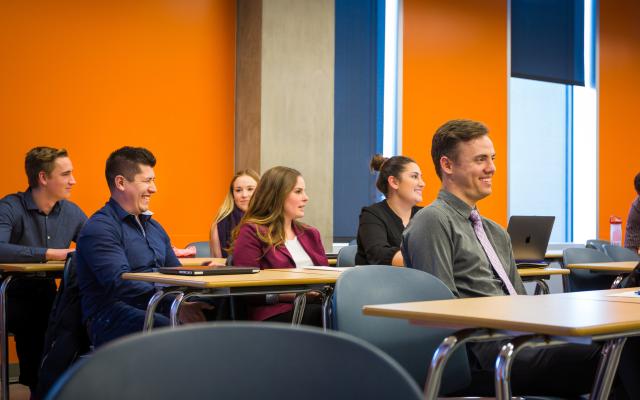Applied Studies
Experience + Research = Applied Studies Course
Applied Studies are customized work-integrated learning courses that allow you to earn academic credit by combining practical work experience with your academic studies.
Benefits
Start Planning
1. Find a Relevant Position
Start by searching for a work placement (paid or volunteer) that aligns with your field of study. You can explore opportunities on MyExperience's Careers Job board, Faculty discussions and recommended positions, or self-initiate placements. Aim for a minimum of 120 hours of work within a semester in a position related to your professional goals.
To assist you in understanding the process and requirements of Applied Studies and provides valuable information and guidance to employers and faculty members who are new to supporting Applied Studies courses go to:
2. Connect with Applied Studies Instructor
Once you have a potential position or research in mind - it is time to talk to an Applied Studies Instructor.
- Set up an Appointment: Use MyExperience to schedule an appointment with an Applied Studies Instructor. They are experienced professionals who can assist you throughout the process.
- Discuss Course Options: During the appointment, the instructor will provide you with detailed information about the available course options related to your field of study. They will explain the requirements, expectations, and potential outcomes of each course.
- Course Development: The Applied Studies Instructor will guide you in designing a course that aligns with your needs and integrates your work experience or research. They will help you identify the academic components, deliverables, and learning objectives that will enhance your academic growth and practical skills.
Remember, the Applied Studies Instructor is there to help you make the most of your Applied Studies course. Take advantage of their expertise and engage in open discussions to ensure that the course design aligns with your goals and aspirations.
Type of Applied Studies Courses

Disciplinary Credit
Design a 3-credit course in an academic discipline. This course will be supported by an employer partner, an Applied Studies Instructor, and a subject matter expert (faculty member).

Work Experience
Applied Studies 2000 (Pass/Fail)
Create a course that explores a program-related work experience (paid or volunteer) while focusing on your professional development. This course is graded on a pass/fail basis and will be supported by an employer partner and an Applied Studies Instructor.

Work Experience
Applied Studies 2010 (Graded)
Collaborate with an Applied Studies instructor to design a course that combines program-related work experience, professional development, and an academic deliverable. This course will be graded and will be supported by an employer partner and an Applied Studies Instructor.
3. Academic Advising
Engage in a conversation with an Academic Advisor to ensure that the Applied Studies course fits into your program planning guide. They can provide guidance on how the course aligns with your degree requirements and academic goals.
4. Secure Faculty Support for Your Course
- Identify the Relevant Faculty: Determine the faculty member you need support from based on the area you want credit in (e.g., a Kinesiology course requires support from a faculty member in the Kinesiology Department).
- Utilize Resources: If you are unsure of whom to contact, utilize the following resources to find a faculty member working in the research area you are interested in:
- Experts Database: Access the university's Experts Database, which provides a list of faculty members and their areas of expertise.
- University Directory: Consult the university directory to find contact information for faculty members in your desired research area.
- Reach Out to Faculty: Once you have identified potential faculty members, reach out to them directly. Share your course ideas and objectives with them, explaining what you aim to achieve during the Applied Studies course. If needed, collaborate with an Applied Studies Instructor to develop a clear narrative for your course.
- Collaborate with an Applied Studies Instructor: If you require assistance in developing your course proposal or communicating your ideas effectively, work closely with an Applied Studies Instructor. They can provide guidance and support in aligning your objectives with the requirements of the Applied Studies program.
5. Apply for Applied Studies Course
You are required to submit two application forms for approval prior to being registered by the Applied Studies Office.
- Disciplinary Credit Course
- Work Placement Application: Fill out the application form, indicating your work placement and employer details.
- Course Proposal Application: Submit the application form, outlining your course details, objectives, and academic supervisors' information.
- Work Experience Course
- Work Placement Application: Fill out the application form, indicating your work placement and employer details.
- Course Proposal Application: Submit the application form, outlining your course details, objectives, and Applied Studies Instructors' information.
Remember to submit both the Work Placement Application and Course Proposal Application forms, and stay responsive to any communication from the Applied Studies Instructor regarding your registration and introductory sessions.
Once you have submitted your applications, an Applied Studies Instructor will review them. If approved, you will be contacted regarding your registration and introductory sessions for the course.
Applied Studies Cohorts
Join a group of students and an Applied Studies instructor in a course that combines program-related work experience, professional development, and an academic deliverable.
Student Stories
Where theatre meets neuroscience: A one-of-a-kind class at ULethbridge
Art students gain hands-on experience through Gushul Residency
Centre for Indigenous Arts Research & Technology builds space for Indigenous sovereignty, survivance

This (applied study) has enhanced my education in so any ways that I could not have imagined, nor learned in the classroom. It is enhancing my education by giving me hands on experience in my field of study … and has allowed me to gain so much real world experience, as well as develop important life skills.
Amanda Maki, BA - Psychology
